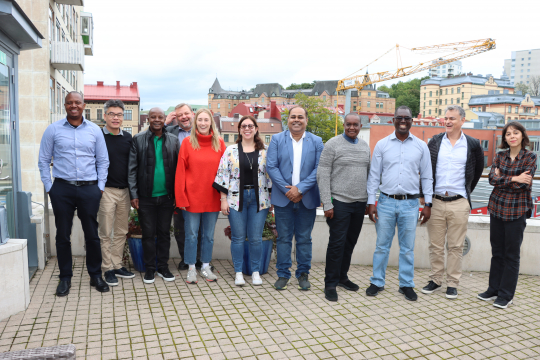The SDG 8 Initiative, which is coordinated from the University of Gothenburg, includes several collaborating institutions, among others eight so-called Satellite Universities in low- and middle-income countries. A workshop on August 22 in Gothenburg was dedicated to discussing the role of those.
The International Association of Universities (IAU) launched an initiative referred to as IAU Global Cluster on HESD in 2019, with the purpose of accelerating and increasing collaboration regarding higher education institutions’ work for sustainable development. The IAU appointed one lead university for each SDG, with additional institutions invited on board as ‘satellites’, resulting in a global network of universities working together to share knowledge, develop expertise, and joint projects to address the global goals set in Agenda 2030. The University of Gothenburg leads the sub-cluster on SDG 8.
The current satellite universities have a natural connection to the University of Gothenburg and to each other since they are hosting the EfD centers in Uganda, Ethiopia, Nigeria, Tanzania, Kenya, Chile, Colombia, and Vietnam respectively. The discussions showed that there is a lot of work going on related to SDG 8 already, as well as other sustainable development goals. The way forward is now mapping this work, improving collaboration structures, and increasing synergies within the SDG 8 Initiative.
Important to inform policymakers
Six of the eight Satellite Universities were represented on-site at the workshop which took place at the School of Economics, Business, and Law at the University of Gothenburg.
Isabel Toman, Program Officer at the International Association of Universities (IAU) participated remotely from Paris and kicked off the workshop by stressing the importance of the cluster networks for higher education’s role towards the SDGs. She encouraged the satellites to take action within this group, for example: To make their role in the initiative more official and communicate it at their university, create relevant networks, propose joint activities, and finally, reach out to policymakers and other stakeholders.
Much is being done already
The discussions revolved around three main questions: What work is currently going on connected to SDG 8, what potential is there for South-South collaboration, and finally, what kind of support is needed from EfD’s Global Hub?
One example of current work from the University of Ho Chi Minh City in Vietnam is that it has a Sustainable Development Team that undertakes research on all the SDGs.
“We have produced 300 academic publications related to SDGs in three years,” said Pham Khanh Nam, Center Director of EfD Vietnam.
“We could set up a sub-group specifically for SDG 8”.
The University of Concepción, Chile is another example where the work on sustainability is substantial. The university established a sustainability unit in 2022 which, according to Marcela Jaime Torres, Center Director EfD Chile, has raised the level of the SDG work at the university.
“We keep statistics on what goals the research contributes to. The whole university has updated its strategy and values to reflect what we contribute to society on sustainable development,” she says.
More discussions are needed
Richard Mulwa, University of Nairobi, and Center Director of EfD Kenya remarked that there is a lot of research conducted that relates to SDG 8 but is not formalized within the frame of the SDG 8 Initiative.
The next steps include further and more detailed mapping. After that: find relevant research collaboration options.
And finally, the book on SDG 8 that is being compiled by the participants in the initiative is a valuable asset when building capacity on SDG 8. More discussions are needed, however, on how to make the best use of it.
“I see the book as a tangible outcome of this initiative and a proof that the collaborative semi-formal approach in the cluster is working,” commented Isabel Toman.
“It will also be a great resource to others as well as members of the SDG 8 cluster, and other clusters.”
By: Petra Hansson
Facts – the SDG 8 Initiative
The SDG 8 Initiative at the University of Gothenburg includes researchers in three faculties – the School of Business, Economics and Law, Social Science, and Sahlgrenska Academy. The SDG 8 Initiative also includes participation from eight satellite universities.
The University of Gothenburg is part of the International Association of Universities (IAU) and its Higher Education and Research for Sustainable Development (HESD) cluster. The organization has appointed one university to lead the collaboration on each sustainable development goal (SDG) of the 2030 Agenda. The University of Gothenburg is the lead on SDG 8, Decent work and economic growth.
The initiative is coordinated by Environment for Development at the School of Business, Economics, and Law at the University of Gothenburg.
Collaborating partners are Chalmers University of Technology, Karolinska Institute, and The European Network for Education and Training in Occupational Safety and Health (ENETOSH).
The SDG 8 Initiative also includes eight satellite universities:
Makerere University, Uganda, Addis Ababa University, Ethiopia, University of Nigeria, Nigeria, University of Dar es Salaam, Tanzania, University of Nairobi, Kenya, University of Concepción, Chile, Universidad de los Andes, Colombia, and the University of Economics Ho Chi Minh City, Vietnam.
